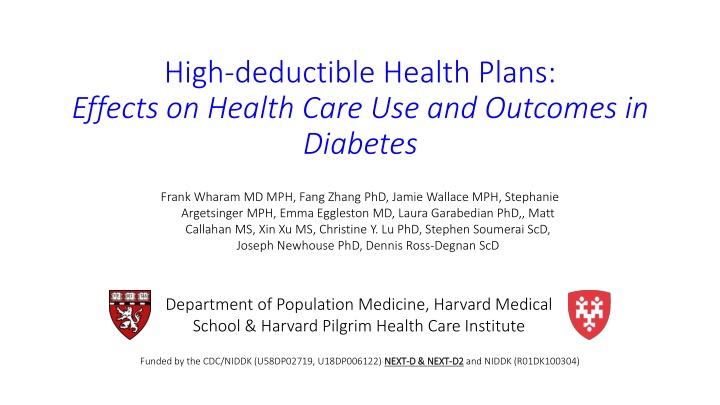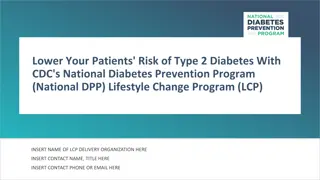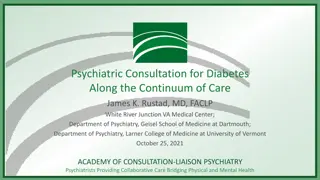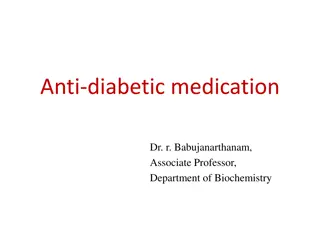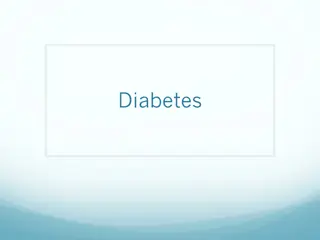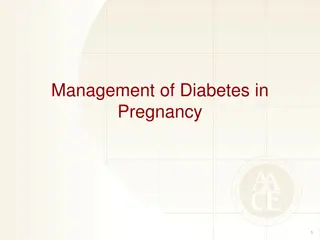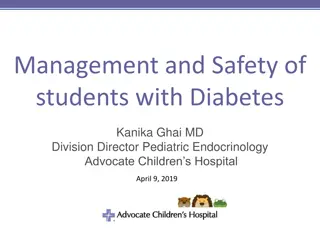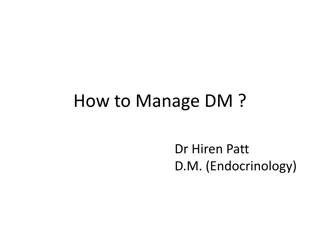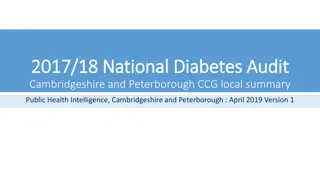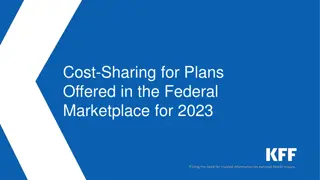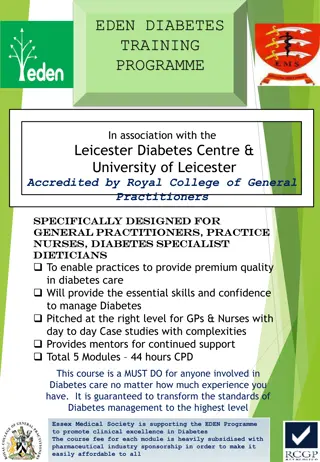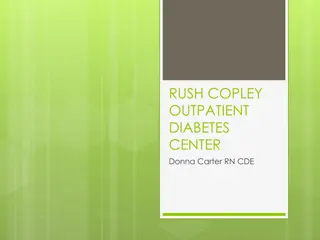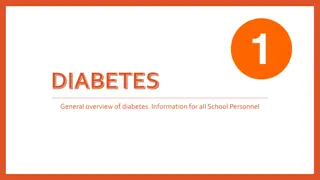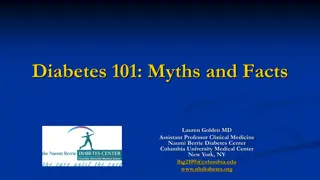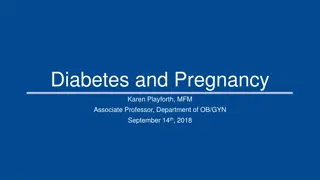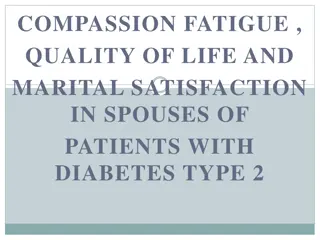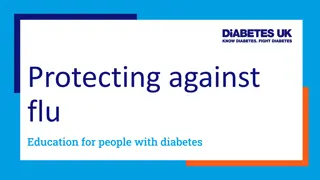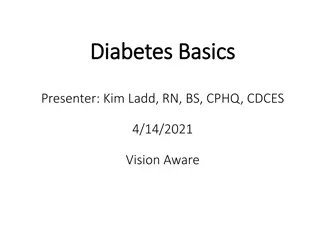Effects of High-Deductible Health Plans on Diabetes Outcomes
This study analyzes the impact of high-deductible health plans on health care use and outcomes in diabetes. It examines changes in out-of-pocket costs, benefits of care, and value-based insurance design in modern health plans.
Download Presentation

Please find below an Image/Link to download the presentation.
The content on the website is provided AS IS for your information and personal use only. It may not be sold, licensed, or shared on other websites without obtaining consent from the author.If you encounter any issues during the download, it is possible that the publisher has removed the file from their server.
You are allowed to download the files provided on this website for personal or commercial use, subject to the condition that they are used lawfully. All files are the property of their respective owners.
The content on the website is provided AS IS for your information and personal use only. It may not be sold, licensed, or shared on other websites without obtaining consent from the author.
E N D
Presentation Transcript
High-deductible Health Plans: Effects on Health Care Use and Outcomes in Diabetes Frank Wharam MD MPH, Fang Zhang PhD, Jamie Wallace MPH, Stephanie Argetsinger MPH, Emma Eggleston MD, Laura Garabedian PhD,, Matt Callahan MS, Xin Xu MS, Christine Y. Lu PhD, Stephen Soumerai ScD, Joseph Newhouse PhD, Dennis Ross-Degnan ScD Department of Population Medicine, Harvard Medical School & Harvard Pilgrim Health Care Institute Funded by the CDC/NIDDK (U58DP02719, U18DP006122) NEXT NEXT- -D & NEXT D & NEXT- -D2 D2 and NIDDK (R01DK100304) Confidential
I. Background II. Out-of-pocket cost increases for high-value care after HDHP switch III. Preservation of low out-of-pocket costs for high-value care after HDHP switch IV. Out-of-pocket cost decreases for high-value care V. Discussion Outline Confidential
High-deductible health plan (HDHP)* growth High- deductible Health Plans: Overview and Design 60% 50% Enrolled in HDHP, % Enrolled in HDHP, % 40% 30% 20% 10% 0% Confidential Source: Kaiser Family Foundation 2019 Employer Health Benefits Survey; *HDHP: >=$1000 / year
1.2 Low OOP for high-value care High OOP for high- value care 1 High High- deductible Health Plans: Overview and Design Benefit/Necessity of Care 0.8 0.6 High OOP for low-value care 0.4 Low 0.2 0 $1000 High $7000 Low 0 0.2 0.4 0.6 0.8 1 1.2 Out-of-pocket (OOP) Cost Confidential
1.2 Low OOP for high-value care 1 High Value-based Health Insurance Design (VBID) Benefit/Necessity of Care 0.8 0.6 High OOP for low-value care 0.4 Low 0.2 0 $1000 High $7000 Low 0 0.2 0.4 0.6 0.8 1 1.2 Out-of-pocket (OOP) Cost Confidential
Increasing prevalence of plans with select $0 meds (preventive drug lists) Value-based Health Insurance Design (VBID) 14% 12% Members with PDL, % 10% 8% 6% 4% 2% 0% Confidential Source: Authors preliminary analysis of Optum data; please do not distribute.
Modern HDHPs allow insights about OOP/value combinations and impacts High- deductible Health Plans: Framework for Research VBID Features Anti-VBID Features Health care utilization Health outcomes VBID Features HDHPs Confidential
Outline I. Background II. Out-of-pocket cost increases for high-value care after HDHP switch III. Preservation of low out-of-pocket costs for high-value care after HDHP switch IV. Out-of-pocket cost decreases for high-value care V. Discussion Confidential
1.2 Outpatient visits for acute complications (eg, pneumonia, dehydration, angina) Macrovascular disease testing and treatment 1 High Diabetes Measures: Services Benefit/Necessity of Care 0.8 0.6 0.4 Low 0.2 0 $1000 High $7000 Low 0 0.2 0.4 Out-of-pocket Cost 0.6 0.8 1 1.2 Confidential
1.2 ED visits for acute complications & high-severity Dxs (eg, kidney stones) Hosp days for high- severity conditions 1 High Diabetes Measures: Health Outcomes Benefit/Necessity of Care 0.8 0.6 0.4 Low 0.2 0 $1000 High $7000 Low 0 0.2 0.4 Out-of-pocket Cost 0.6 0.8 1 1.2 Confidential
What is the effect of high OOP costs on high-value care? Out-of-pocket costs increase by ~45% ~45% Confidential
Low-income (but not high-income) diabetes patients delay outpatient complication visits High Income1 Low Income1 (1/3 population) Switch to HDHP Control HDHP Baseline Year 1 Year 2 Baseline Year 1 Year 2 aHR: 1.00 0.95 0.98 0.89* 0.89* Wharam JF, Zhang F, Eggleston EM, Lu CY, Soumerai S, Ross-Degnan D. JAMA-IM. 2017. *p < 0.05. 1High vs low income categorization based on residence in census block group with < or > 10% of households below the federal poverty level. Confidential
experience increased complications at the emergency department, High Income1 Low Income1 Switch to HDHP Control HDHP Baseline Year 1 Year 2 Baseline Year 1 Year 2 Relative Annual : - -7%* 7%* 22%* 22%* Wharam JF, Zhang F, Eggleston EM, Lu CY, Soumerai S, Ross-Degnan D. JAMA-IM. 2017. *p < 0.05. 1High vs low income categorization based on residence in census block group with < or > 10% of households below the federal poverty level. Confidential
and more high-severity hospitalization days. Low Income1 Overall Year 1 Year 1 Baseline Baseline Relative Annual : 4% 27%* 27%* Wharam JF, Zhang F, Eggleston EM, Lu CY, Soumerai SB, Ross-Degnan D. Diabetes Care. 2018. *p < 0.05. 1High vs low income categorization based on residence in census block group with < or > 10% of households below the federal poverty level. Confidential
And the overall HDHP diabetes population delays cardiovascular disease care. Major Symptom or Sign Major Treatment Major Diagnostic Test Follow-up delay 1.5 months* 1.5 months* 1.9 months* 1.9 months* 3.1 months* 3.1 months* Confidential Wharam JF, Lu CY, Zhang F, Callahan M, Xu X, Wallace J, Ross-Degnan D, Newhouse J. Ann Intern Med. 2018. *p < 0.05
Outline I. Background II. Out-of-pocket cost increases for high-value care after HDHP switch III. Preservation of low out-of-pocket costs for high-value care after HDHP switch IV. Out-of-pocket cost decreases for high-value care V. Discussion Confidential
1.2 Secondary preventive tests Antidiabetic and cardioprotective medication use 1 High Diabetes Measures: Services Benefit/Necessity of Care 0.8 0.6 0.4 Low 0.2 0 $1000 High $7000 Low 0 0.2 0.4 Out-of-pocket Cost 0.6 0.8 1 1.2 Confidential
1.2 Major adverse cardiovascular events 1 High Diabetes Measures: Health Outcomes Benefit/Necessity of Care 0.8 0.6 0.4 Low 0.2 0 $1000 High $7000 Low 0 0.2 0.4 Out-of-pocket Cost 0.6 0.8 1 1.2 Confidential
What is the effect of maintaining low OOP costs on high-value care? Mean OOP for Meds, $ Confidential
Disease monitoring is unchanged, Pre-to-Post Change among HDHP vs Control Members Confidential Wharam JF, Zhang F, Eggleston EM, Lu CY, Soumerai S, Ross-Degnan D. JAMA-IM. 2017.
medication use is essentially unchanged, Oral anti- diabetic meds Insulin Switch to HDHP Confidential
and major adverse macrovascular disease events1 are unchanged. aHR: 0.98 (0.80, 1.19) Confidential Wharam JF, Wallace J, Zhang F Xu X, Lu CY, Hernandez A, Ross-Degnan D, Newhouse JP. JNO.2020; 1MI, stroke, and extremity amputation
Outline I. Background II. Out-of-pocket cost increases for high-value care after HDHP switch III. Preservation of low out-of-pocket costs for high-value care after HDHP switch IV. Out-of-pocket cost decreases for high-value care V. Discussion Confidential
1.2 Antidiabetic and cardioprotective medication use (preventive drug lists. PDLs) 1 High Diabetes Measures: Services Benefit/Necessity of Care 0.8 0.6 0.4 Low 0.2 0 $1000 High $7000 Low 0 0.2 0.4 Out-of-pocket Cost 0.6 0.8 1 1.2 Confidential
1.2 ED visits for acute diabetes complications 1 High Diabetes Measures: Health Outcomes Benefit/Necessity of Care 0.8 0.6 0.4 Low 0.2 0 $1000 High $7000 Low 0 0.2 0.4 Out-of-pocket Cost 0.6 0.8 1 1.2 Confidential
What is the effect of reducing OOP costs through PDLs on use/outcomes? Insulin Oral Antidiabetic 35 35 Out-of-pcoket spending, $ Out-of-pcoket spending, $ 30 30 Switch to PDL 25 25 20 20 15 15 Control 10 10 5 5 PDL 0 0 -12-10 -8 -6 -4 -2 1 Months Relative to PDL Switch 3 5 7 9 11 -12-10 -8 -6 -4 -2 1 Months Relative to PDL Switch 3 5 7 9 11 Relative change: - -49%* 49%* - -62%* 62%* Ross-Degnan D, Zhang F, Lu CY, Wallace J, Soumerai SB, Wharam JF. Med Care. 2020. n = 1372 PDL and 2599 Control members; *p < 0.05 Confidential
Oral antidiabetic and other diabetes- related medication use increases High Income1 Low Income1 HSA-HDHP with PDL HSA-HDHP with PDL HSA-HDHP HSA-HDHP Switch to PDL Relative Annual : 5% 17%* 17%* Ross-Degnan D, et al. Med Care. 2020. HSA-HDHP, Health Savings Account HDHP; PDL, preventive drug list; *p < 0.001. 1High vs low income categorization based on residence in census tract with < or > 10% of households below the federal poverty level. Confidential
and ED acute diabetes complication visits decrease decrease. 100 Cumulative ED complication Comparison group 80 Switch to PDL visits/1000 60 Drug cost-sharing reduction group 40 20 0 -12 -9 -6 -3 0 3 6 9 12 15 18 21 24 Months relative to index date Relative change: - -12%* 12%* Confidential Source: authors preliminary analyses; please do not distribute. *p < 0.05.
I. Background II. Out-of-pocket cost increases for high-value care after HDHP switch III. Preservation of low out-of-pocket costs for high-value care after HDHP switch IV. Out-of-pocket cost decreases for high-value care V. Discussion Outline Confidential
Summary: impact of high OOP costs on high-value care in diabetes Delayed diabetes complication visits, macrovascular disease care Increased short Increased short- -term adverse outcomes term adverse outcomes among among low low- -income income diabetes patients No detectable adverse effects on high- income diabetes patients diabetes patients Confidential (1) Wharam JF et al. JAMA-IM. 2017. (2) Wharam JF et al. Diabetes Care. 2019. (3) Wharam JF et al. Ann Int Med. 2018.
Summary: impact of VBID features on high-value care in diabetes Preserved disease monitoring Increases in diabetes medication use when out-of-pocket costs decrease Lower emergency department visits for acute Lower emergency department visits for acute diabetes complications diabetes complications Unchanged major cardiovascular outcomes Confidential Wharam et al. NEJM. 2013. (1) Wharam JF et al. JAMA-IM. 2017. (2) Ross-Degnan D et al. Med Care. 2020.
Policy opportunity VBID works, but higher-income patients might be unaffected / might not need it When resources are tight, VBID should be preferentially given to low-income or other vulnerable populations Population-tailored health insurance designs e.g., Preferentially fund the health savings accounts of low-income workers to protect their health Discussion Confidential Wharam et al. NEJM. 2013. Wharam JF, Ross-Degnan D, Rosenthal M. NEJM. 2013.
Thank you to: CDC / NIDDK / NEXT-D Ed Gregg, PhD Mo Ali, MD Pamela Thornton, PhD Theresa Jones, MD UnitedHealth Sam Ho, MD Bob Luchs Dave Steinfeld Donna O Shea, MD OptumInsight Ben Klein Dawn Albright HMS Dept of Population Medicine Stephanie Argetsinger, MPH Matt Callahan, MS Laura Garabedian, PhD Robert LeCates, MA Chris Lu, PhD Dennis Ross-Degnan, ScD Steve Soumerai, ScD Jamie Wallace, MPH Xin Xu, MS Fang Zhang, PhD HMS Dept of Health Care Policy Joseph Newhouse, PhD West Virginia University Emma Eggleston, MD jwharam@post.harvard.edu Confidential
